Despite Marsy's Law ruling, TPD won't release information on officer involved in shooting
SPECIAL SUNSHINE WEEK REPORT: The Tallahassee Democrat is publishing this story during Sunshine Week, which aims to recognize the importance of the state's open records laws and the public's right to know, while spreading the message that government operates best when it operates in the open, for all to see.
After the Florida Supreme Court held that Marsy’s Law can’t be used to hide the identities of law enforcement who used deadly force, the Tallahassee Police Department is refusing to release the name and personnel file for one of two officers at the heart of the landmark case.
The state’s high court ruled Nov. 30 that Marsy’s Law, a constitutional amendment approved by voters in 2018 that grants certain rights to crime victims, doesn’t guarantee anonymity for any victim, police officers included.
The decision was expected to open the door to release of information that police departments across Florida secreted away in the wake of Marsy’s Law's passage, including the names of not only crime victims but police officers who considered themselves victims of the very suspects they killed.
However, TPD has essentially thwarted the ruling, denying multiple requests from the Tallahassee Democrat for basic information about one of the two officers. The department declined to release even a single page of his personnel file, citing a "secondary" public records exemption rather than Marsy’s Law as it had previously.
David Cuillier, director of the Joseph L. Brechner Freedom of Information Project at the University of Florida, said the public’s interest in this case far outweighs the privacy interest of a police officer.
“Police officers have the power to detain, tase and ultimately kill, and with that authority comes great responsibility,” Cuillier said. “Making officer names public can bring new facts to light ... that may shed light on the incident. That can save taxpayers millions in settlements and ultimately save lives. Transparency allows the public to hold our institutions accountable. It builds public trust in law enforcement that they deserve.”
TPD Chief Lawrence Revell declined to comment for this article. The city, which led the fight to reveal the officers' names, is also now silent. City Manager Reese Goad and City Attorney Amy Toman did not respond to emails from the Democrat. Former City Attorney Cassandra Jackson, who led the fight for the city, referred questions to the city attorney and clerk.
The Supreme Court ruling sprang from two unrelated incidents in which Tallahassee police officers shot and killed armed suspects who were threatening them in 2020, the same year George Floyd’s death at the hands of Minneapolis police fueled protests across the country.
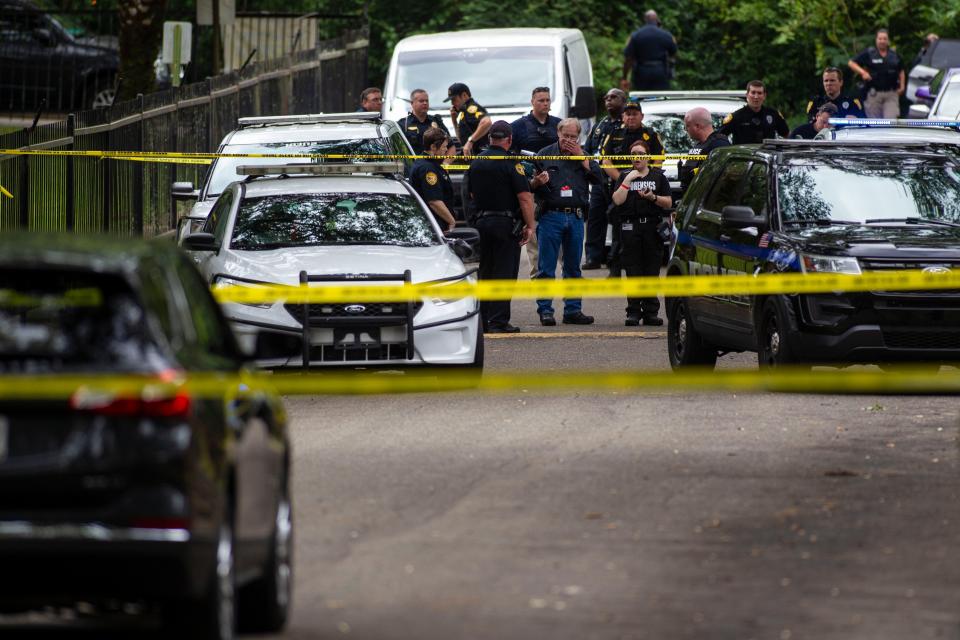
Unlike in that sensational case, police in the local shootings were found by grand juries to have used lawful and justifiable force against the suspects, Wilbon Woodard, who rushed at an officer with a hunting knife, and Tony McDade, who aimed a gun at an officer after stabbing a neighbor’s son to death.
The officers, known in court documents as John Doe 1 and John Doe 2, sought anonymity under Marsy’s Law and sued after the city announced plans to release their names. The court fight lasted more than two years, with the city and media groups, including the Tallahassee Democrat and parent company Gannett, on one side and the officers and police union on the other.
After the Supreme Court issued its ruling, the Democrat asked TPD for unredacted incident reports that would name the officers. In response, TPD released records that identified John Doe 1, who killed Woodard, but not John Doe 2, who killed McDade, a Black transgender man whose name became a rallying cry at local protests and was even invoked by President Barack Obama.
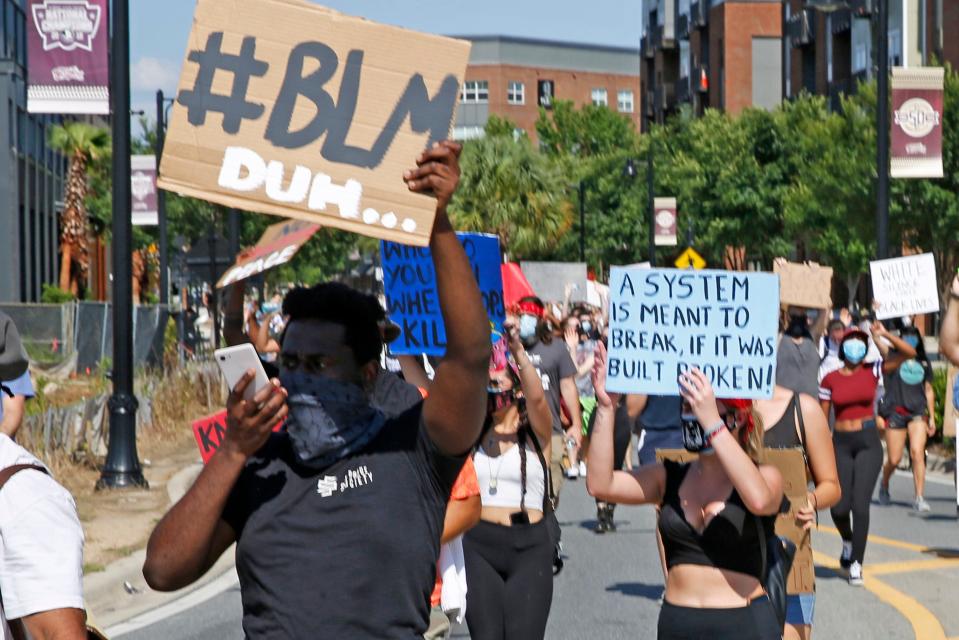
TPD and the State Attorney's Office, which also declined to release John Doe 2's name, cited a subsection of statutes, Chapter 119.071(4), that includes a number of exemptions, from social security and phone numbers to home addresses and information that would reveal undercover officers or activities.
However, the Leon County Clerk of Court, relying on both the Marsy’s Law decision and guidance from the Florida Court Clerks & Comptrollers association, took an entirely different tack. In response to a request from the Democrat, the clerk’s office released unredacted grand jury reports identifying both officers.
“It was a Supreme Court mandate,” said Clerk of Court Gwen Marshall-Knight. “The court had issued an opinion at the time of your request, so I had to follow the law.”

The grand jury reports identified John Doe 1 as Officer Tyler Poole and John Doe 2 as Officer Glen Charles Farmer, both of whom joined TPD in 2016.
In 2019, Farmer and two officers were sued in federal court by a man who accused them of excessive force over an arrest that left him with “minor scrapes.” The city ended up settling for $20,000, though it disputed the claim and didn’t admit liability.
No use of force complaints in Officer Poole's personnel file
TPD released 520 pages of Officer Poole’s personnel file — a revealing volume of records that includes everything from training certificates and annual evaluations to thank you letters from citizens he encountered on the beat. Poole worked as a law enforcement officer for the Department of Agriculture and as a deputy marshal for the Florida Supreme Court before joining TPD in June 2016.
After his first probationary year, he scored a Level 3 of 5 (consistently demonstrates) on his evaluation and was recommended for permanent status. He scored Level 4 (consistently goes beyond) over five of the next six years, earning a Level 5 (consistently exemplary) in 2022.
There are no use of force complaints in his personnel file. He scored a 3 or 4 for use of force in his evaluations from 2017 to 2021. Use of force was not listed as a category for review in his evaluations from 2022 and 2023.
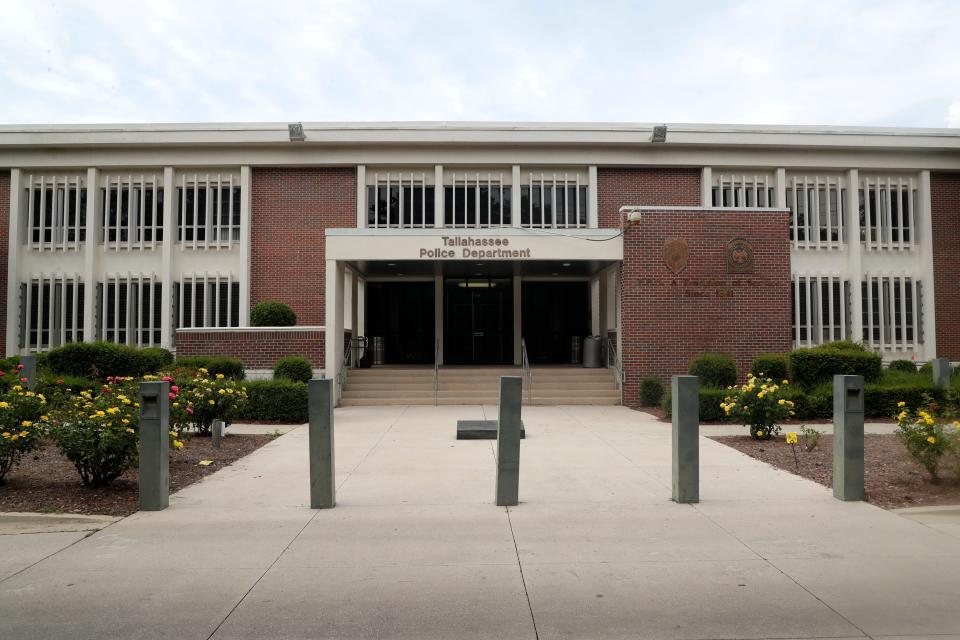
His 2021 evaluation says he “applies proper level of force in accordance with policy” and that “he is able to deescalate force when resistance is overcome.” It noted an incident in which a suspect committed an assault in front of him.
“Officer Poole was justified in using his Taser but attempted to use hand, fist or feet, when that didn’t work Officer Poole stepped back and reassessed. Officer Poole then went to the Taser, due to his command presence he only had to turn the Taser on to get compliance. Good Job!!”
Poole has a single disciplinary action on his record from a June 2023 crash that happened after he backed his police car into an unoccupied vehicle in a Thomasville Road parking lot. There were no injuries, and he was given an oral reprimand.
Citizens call Officer Poole 'incredibly kind and compassionate'
Poole’s evaluation from 2020 references the killing of Woodard, which happened May 19 after police were called to the parking lot of the Super China Buffet on North Monroe Street. Woodard tried to gouge one man’s eyes out, leaving him injured and bleeding, and threatened another with a large hunting knife.
Woodard, who appeared to be suffering with mental illness, was hiding in the bushes when police arrived. He charged at Poole with a knife, prompting the officer to fire twice. After Woodard continued, Poole fired five more times. Woodard’s final words were “I’ll kill ya,” according to the grand jury report.
The grand jury found that Poole’s use of deadly force was “made necessary” by the actions of Woodard, who “ignored Officer Poole’s repeated lawful orders to drop his weapon and gave every indication through his words and actions that he intended to kill Officer Poole.”
“Officer Poole was charged by the suspect who had a knife,” his evaluation says. “Officer Poole made sure the suspect hurt nobody else.”

He was placed on paid leave, which is customary, the day of the shooting and told he could return to work a week later for “temporary administrative assignment.” TPD also scheduled an appointment for him to see a counselor. He was notified Sept. 17, 2020, after the grand jury met, that he could return to regular patrol duties. He was later promoted to detective.
Poole’s file notes that he purchased a bed for a toddler who was badly injured in a traffic crash, helped a colleague whose house was hit by a tornado and volunteered to be deployed to Jackson County after Hurricane Michael hit in 2018 despite damage to his own home. One couple wrote TPD after he recovered their stolen car.
“Detective Poole was incredibly kind and compassionate throughout the situation,” they wrote. “Our story has a happy ending. But even if it didn’t, our experience with the Tallahassee Police Department was fantastic!"
Officer Farmer called for neighborhood engagement before 'suicide-by-cop' encounter with McDade
With public access to his TPD personnel file denied, far less is known about Officer Farmer. A Google search yields only a few results, including the federal lawsuit and a WCTV article about a park groundbreaking in the Bond neighborhood published a few months before the McDade shooting.
“The only way we're going to solve any problems the community is by engaging with the people who live in that particular neighborhood," said Farmer, who attended the event with members of TPD’s bicycle-riding Community Oriented Policing & Problem Solving (COPPS) outfit.
Farmer worked as a state correctional officer from January to November 2014 and as an officer with the Crestview Police Department from November 2014 to September 2016, according to Florida Department of Law Enforcement records. He separated voluntarily from both agencies for reasons that didn’t involve misconduct and joined TPD shortly after leaving the Crestview PD.
The Crestview Police Department, in contrast to TPD, released 242 pages of Farmer's personnel file, though there were numerous redactions, including documents blacked out in their entirety. The records show he was evaluated twice during his time with the department, though the reviews were not released.
In his application, he wrote that there were two ways to serve his country: through the military or law enforcement.
"My choice has been to serve domestically through law enforcement," Farmer wrote. "All citizens have the right to live peacefully and it comes down to law enforcement to uphold this peace through the law. For the good of the people, some must place themselves in harm's way, pledging their lives and courage to protect their community."
On the morning of May 27, 2020, he was thrust into an unfolding drama and forced to make a split-second, life-and-death decision that culminated in the killing of McDade. Responding to a radio call about a stabbing suspect who was armed with a knife and gun, he arrived in uniform at Leon Arms apartments to find McDade approaching his patrol car.
Farmer shouted commands as McDade walked “purposefully” toward him and raised a gun at him in a “shooting stance,” according to the grand jury, which heard eyewitness testimony from another officer and McDade’s own mother. Farmer fired seven times; McDade, struck three times, died at the scene.
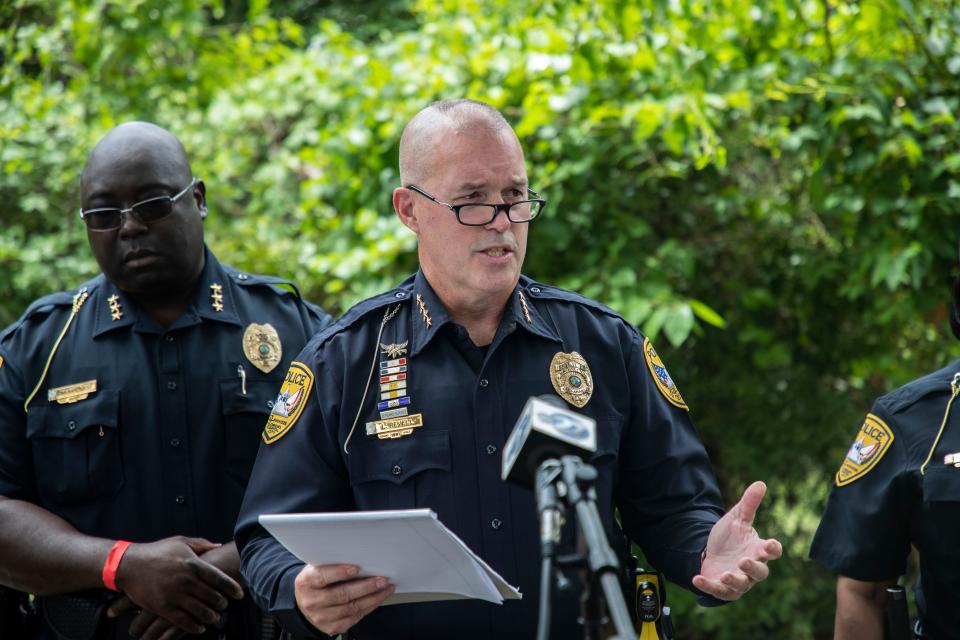
In the hours before shooting, an armed McDade had twice threatened a next-door neighbor’s family and gotten into a brawl with some of them. McDade went live on Facebook — threatening to kill the neighbor’s family and commit suicide-by-cop — before sneaking up on Malik Jackson, his neighbor’s 21-year-old son, and fatally stabbing him.
The grand jury found that Farmer’s use of deadly force was “appropriate” under the circumstances and that it adhered to both the law and his police training.
“Once Officer Farmer was confronted with an armed subject fitting the description of the stabbing suspect, the situation quickly evolved into a self-defense situation for Officer Farmer,” the grand jury said. “McDade’s actions coupled with the information that McDade had just stabbed someone, gave Officer Farmer a reason to believe he was about to be shot or killed.”
The grand jury noted that Farmer failed to power up his body camera the morning of the shooting, a violation of TPD policy, though body-cam footage was available from the other officer at the scene. The panel recommended TPD review policies and procedures and put in place measures “to avoid this type of failure in the future.”
Federal lawsuit alleging excessive force by TPD officers ends in $20K settlement
In 2019, Farmer and two other TPD officers were sued in federal court by a man who alleged they used excessive force when they arrested him two years earlier. Eric Brooks, who filed the civil rights complaint from prison, has a long history of arrests and convictions on charges including manslaughter and burglary.
On Nov. 15, 2017, officers responded to a call about a man, later identified as Brooks, who was knocking on doors at an apartment complex on Jim Lee Road. The police report says he showed signs of "erratic behavior" and at one point darted into the road to flag down an oncoming vehicle. Blevins and Farmer grabbed Brooks to pull him back, and all three ended up on the ground, with the officers on top of him.
"Officer Farmer and I wrestled with Brooks on the asphalt for a couple of minutes, before other officers arrived," Blevins wrote in the police report.
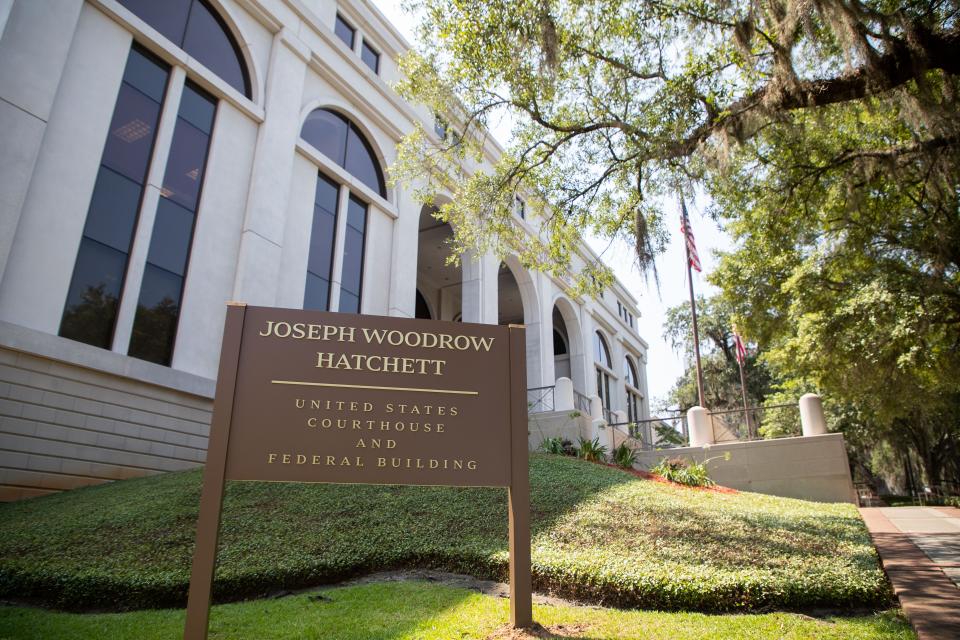
Brooks was arrested on charges of resisting arrest, battery of a law enforcement officer and depriving an officer of his weapon. He was convicted on the first and third count but acquitted on battery, according to court records. He was adjudicated a habitual felony offender and sentenced to five years in prison.
In his handwritten complaint, Brooks accused the officers of slamming him “face first” in the road and said he was “beat, punched, kicked, choked, dragged and tased "multiple times." He accused a third TPD officer, Justin Hill, of handcuffing him so tightly he lost feeling in his hands and arms.
In pretrial stipulations filed in 2022, Brooks’ attorney, Gary Lee Printy of Tallahassee, said his client feared that Blevins and Farmer “were going to kill him." He said Brooks was treated for “minor scrapes” and arrived at the county jail with a swollen face and Taser probe marks near his left wrist.
Assistant City Attorney Jennifer Painter denied in court filings that the officers used excessive force or violated Brooks’ constitutional rights. She said the officers used the same degree of force that "a reasonable and prudent law enforcement officer" would have applied in the same situation.
In March 2022, on the eve of trial, the city and Brooks agreed to settle. The general release notes that neither side admitted liability and that the claims were “denied and disputed.” Under city policy, the $20,000 payout was approved at the staff level and never appeared before city commissioners.
'A cloak of anonymity for police conduct to the detriment of the public these officers serve'
The Florida Supreme Court, in its 6-0 opinion, held that Marsy’s Law guarantees “no victim — police officer or otherwise — the categorical right to withhold his or her name from disclosure.” The justices emphasized that such a guarantee would not “readily fit” with constitutional rights for citizens to confront witnesses or copy and inspect public records.
The court specifically found that a provision in Marsy’s Law barring the release of records that could be used to “locate or harass” victims or their families doesn’t encompass a victim’s identity.
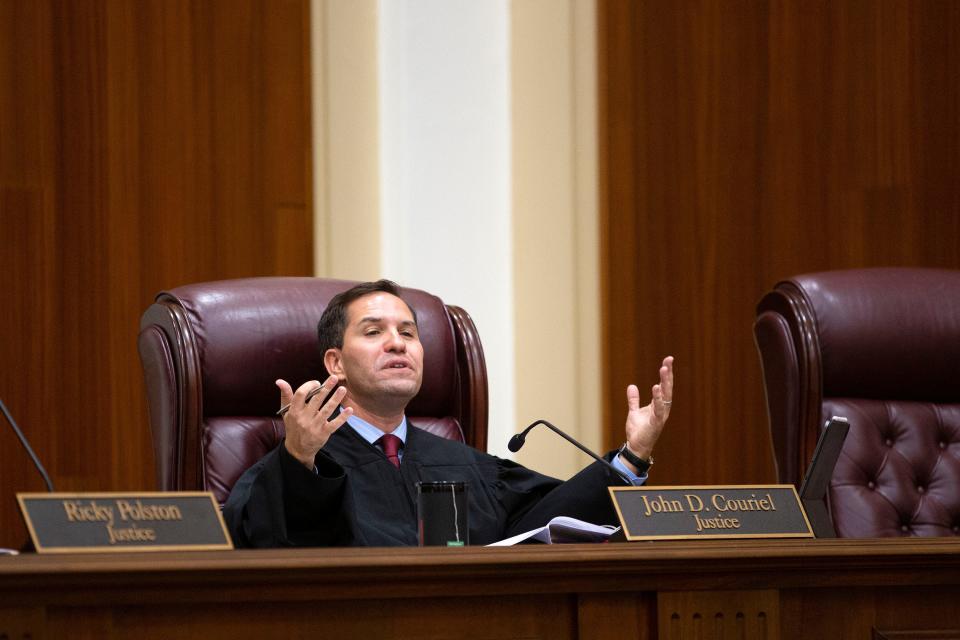
“For it is one thing to identify a person and another altogether to locate or harass him or her,” the court said, adding that “one’s name, standing alone ... communicates nothing about where the individual can be found and bothered.”
The city’s legal team, which included then-City Attorney Jackson, argued during the litigation that “a few officers” led by the police union were transforming Marsy’s Law “into a cloak of anonymity for police conduct to the detriment of the public these officers serve.”
But after the Supreme Court ruling, the City Attorney's Office and city administration, in an abrupt about-face, also denied requests for Farmer's records. The city administration, which has its own records department, cited the same public records exemptions as TPD.
Barbara Petersen, executive director of the Florida Center for Government Accountability, said that under Florida's public records law, if an agency record contains both exempt and non-exempt information, it must redact the exempt information and release the rest.
“There would be a lot of information in a personnel file that is not exempt from disclosure,” including applications, evaluations and training, Petersen said. “TPD is withholding information that they don’t have the authority to withhold.”
'Let's make this a transparent system'
TPD, which stopped releasing the names of homicide victims after Marsy's Law passed, resumed its practice of releasing them after the Supreme Court ruling. The Leon County Sheriff's Office released the names of two people killed in a Jan. 25 murder-suicide but not of a man who was shot and killed Jan. 17 in another "domestic" incident.
Angela Green-Sherrod, an LCSO spokeswoman, said that the agency will continue to "hold back" names and other identifying details about crime victims unless the family grants permission to release the information. She said the agency has always "made it a point" not to apply Marsy's Law to officers in the line of duty.
"We believe in keeping things transparent," she said in an email.
Meanwhile, the Florida Court Clerks & Comptrollers issued guidance in December advising clerks offices not to redact victims' names unless otherwise covered by rules or a court order.
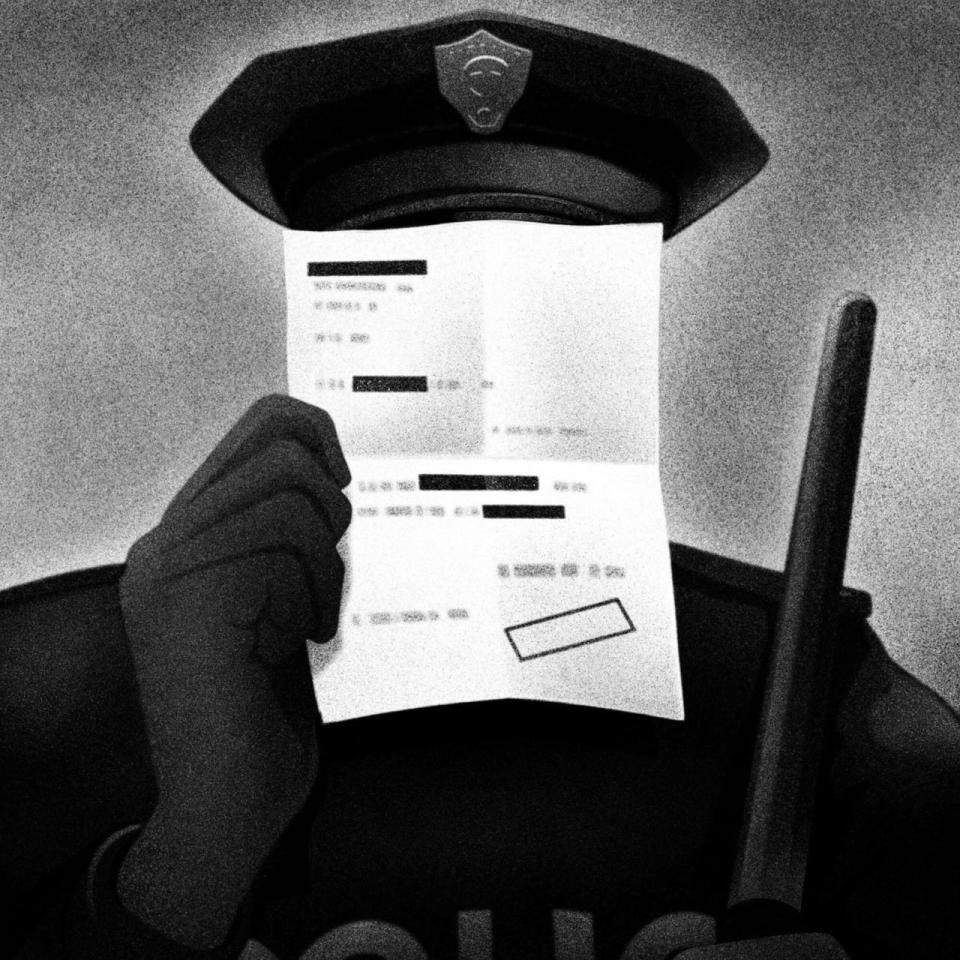
“If the ruling of the court remains unchanged, clerks cannot use Marsy’s Law to redact and hold confidential victims’ names,” the association said. “The court left open the possibility of a legislative change, but any such action by the Legislature would likely need to be adopted by the court to be effective for court records.”
Legislation (HB 1605 and 1607) was introduced the first day of session to exempt the identities of crime victims, including police, from public records. But the bills, which were sponsored by Rep. Chuck Brannan, R-Macclenny, a retired Baker County Sheriff’s Office investigator, never got a committee hearing.
Marsy's Law for Florida, which successfully pushed for the constitutional amendment, issued a statement saying it supports any bill that restores privacy rights of crime victims — with one key caveat.
"We cannot fully support a bill outright unless it includes a provision to ensure that when reviewing the conduct of an on-duty law enforcement officer who has used physical force, the right to privacy of their name must quickly yield to the public’s right to know," said Jennifer Fennell, the group's spokesperson.
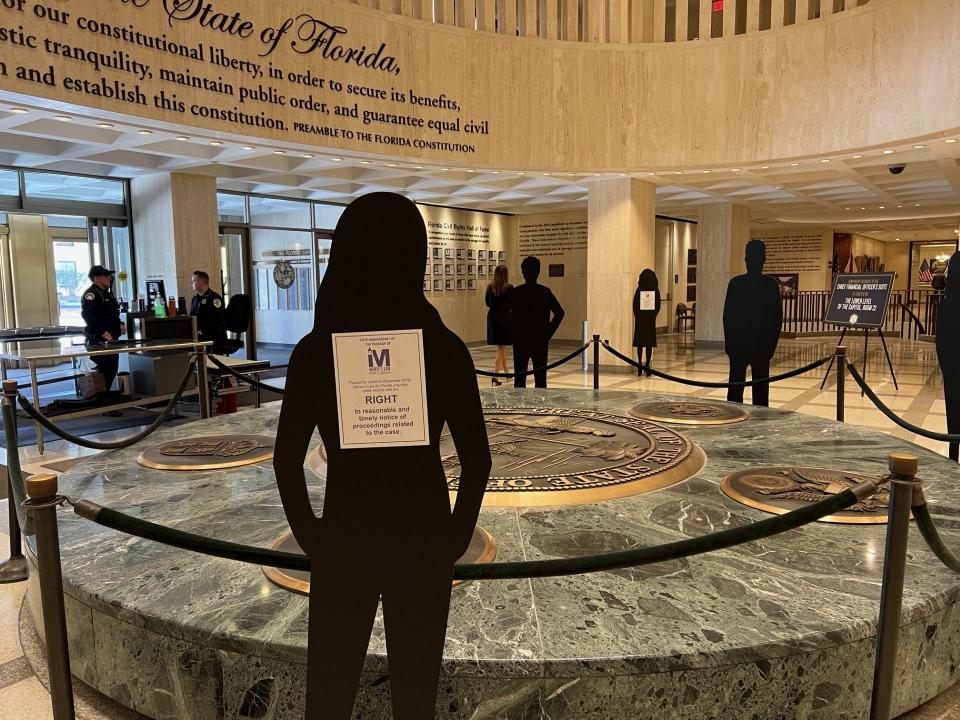
Stephen Webster, a Tallahassee attorney who represented both Farmer and Poole, questioned whether the media, the City Attorney's Office or Marsy's Law for Florida would consider officers who were killed or injured in the line of duty victims. He said their argument that officers were not "persons" and therefore not victims under Marsy's Law was "unreasonable and absurd." He also said that as a result of the litigation, Marsy's Law was "gutted" and privacy rights stripped from crime victims.
"I just don't agree that law enforcement officers simply because they put on a badge surrender all of their rights and agree to become punching bags and shooting targets without any accompanying rights to privacy," Webster said.
Cuillier, executive director of UF’s Freedom of Information Center, said contentious disputes over public records aren’t uncommon after police-involved shootings and that there are often delays in the release of names, usually out of deference to the officers and their families.
“But ultimately, that information comes out, particularly when it goes to court,” he said. “So there’s no use trying to hide it. It should just be forthcoming and open. Let’s make this a transparent system so that the public can trust law enforcement. That’s important (now) more than ever.”
Contact Jeff Burlew at jburlew@tallahassee.com or 850-599-2180.
This article originally appeared on Tallahassee Democrat: Marsy's Law ruling: Tallahassee police shield officer in McDade shooting

